Reflective Learning and Feedback: Orientation for Success Essay
VerifiedAdded on 2023/06/11
|8
|2143
|369
Essay
AI Summary
This essay reflects on the importance of a reflective approach to learning in higher education, emphasizing the value of formative feedback in improving summative assessed work. It uses the Gibbs reflective cycle to articulate learning experiences, analyzing feelings, evaluating the process, and forming an action plan for future improvement. The essay also discusses the nature of feedback and feedforward, highlighting their prominence in informing and enhancing both formative and summative assessments. The reflection covers the student's understanding of their strengths and weaknesses, and how feedback from tutors has helped clarify doubts and improve learning patterns, ultimately aiming to enhance future academic performance. The essay concludes that reflection and feedback are crucial for effective learning and interaction between students and tutors.
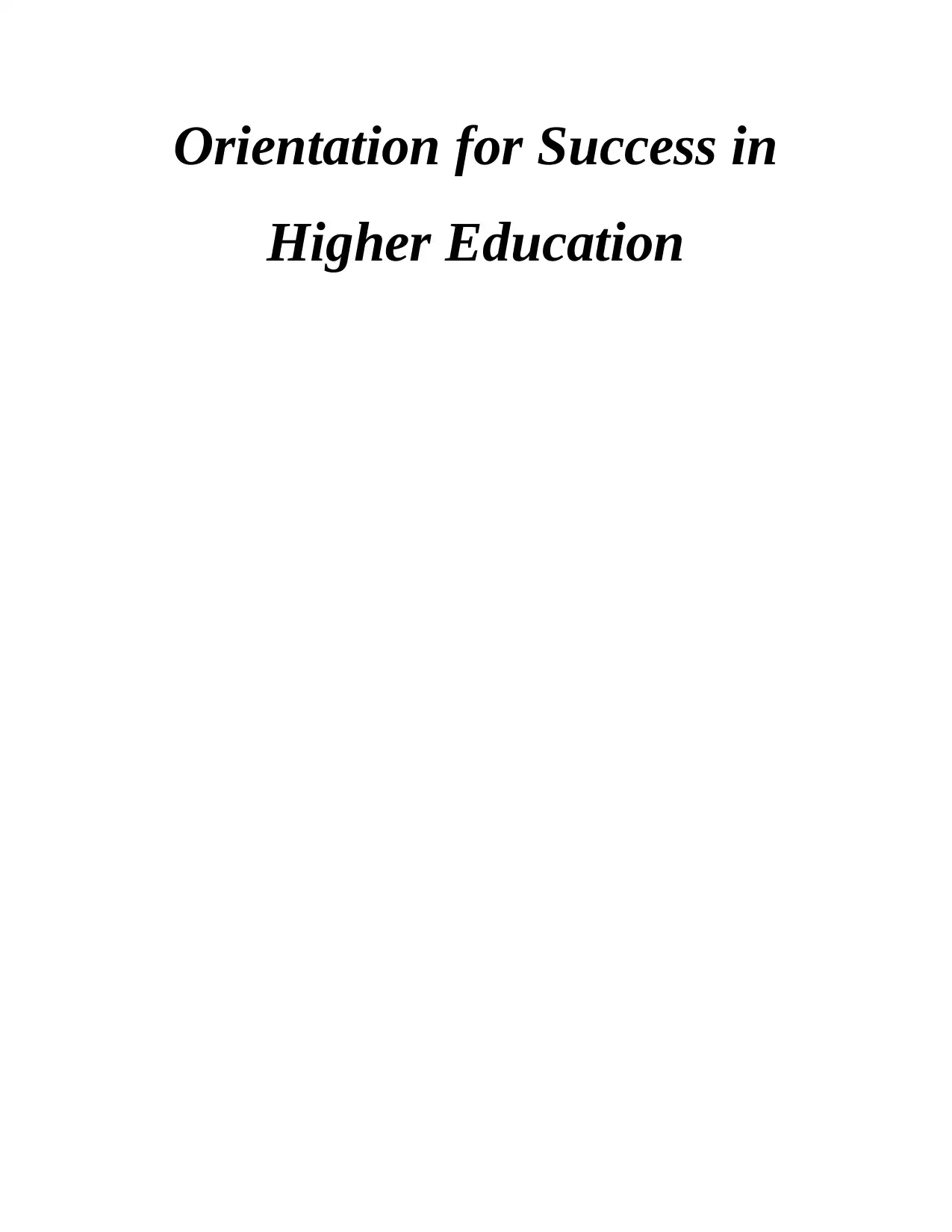
Orientation for Success in
Higher Education
Higher Education
Paraphrase This Document
Need a fresh take? Get an instant paraphrase of this document with our AI Paraphraser
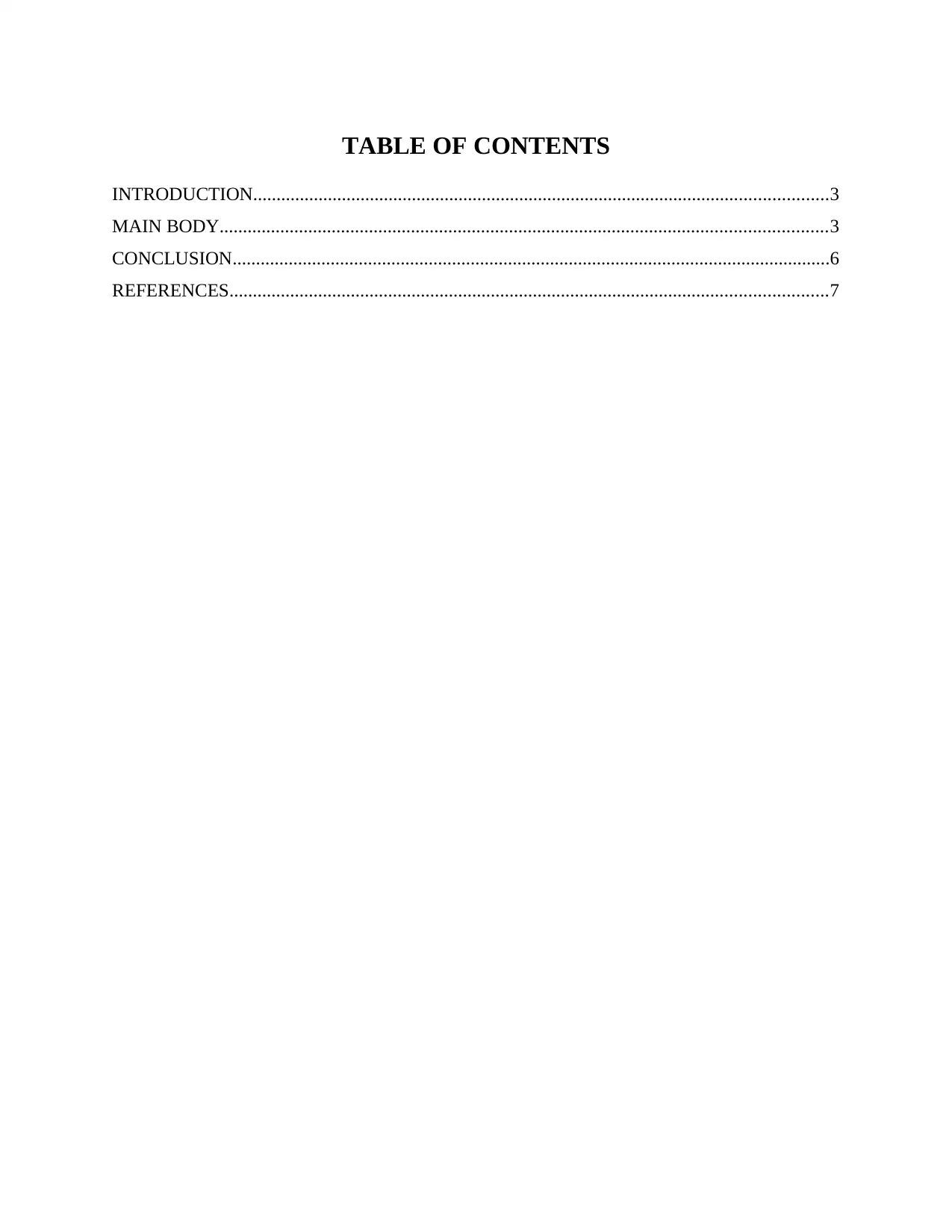
TABLE OF CONTENTS
INTRODUCTION...........................................................................................................................3
MAIN BODY..................................................................................................................................3
CONCLUSION................................................................................................................................6
REFERENCES................................................................................................................................7
INTRODUCTION...........................................................................................................................3
MAIN BODY..................................................................................................................................3
CONCLUSION................................................................................................................................6
REFERENCES................................................................................................................................7
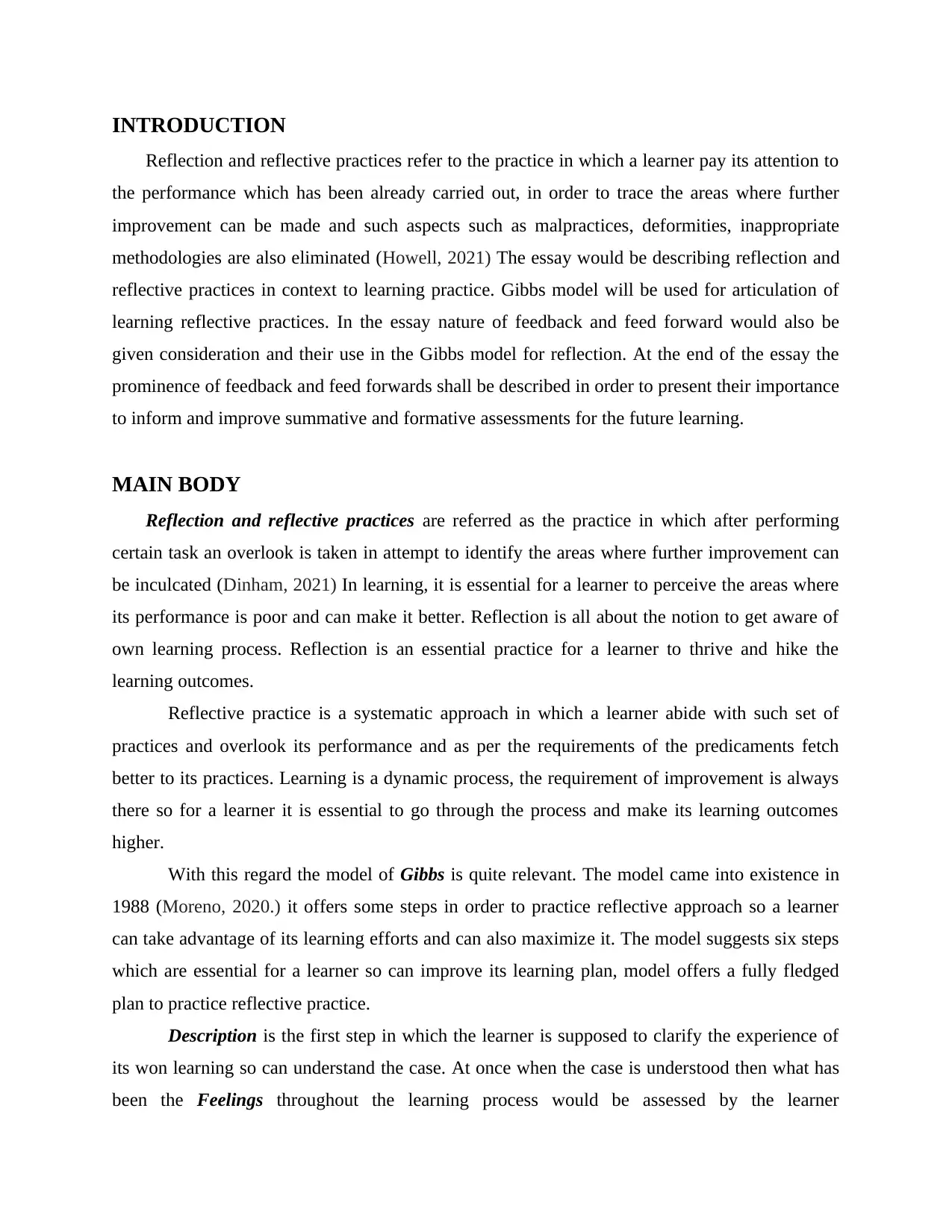
INTRODUCTION
Reflection and reflective practices refer to the practice in which a learner pay its attention to
the performance which has been already carried out, in order to trace the areas where further
improvement can be made and such aspects such as malpractices, deformities, inappropriate
methodologies are also eliminated (Howell, 2021) The essay would be describing reflection and
reflective practices in context to learning practice. Gibbs model will be used for articulation of
learning reflective practices. In the essay nature of feedback and feed forward would also be
given consideration and their use in the Gibbs model for reflection. At the end of the essay the
prominence of feedback and feed forwards shall be described in order to present their importance
to inform and improve summative and formative assessments for the future learning.
MAIN BODY
Reflection and reflective practices are referred as the practice in which after performing
certain task an overlook is taken in attempt to identify the areas where further improvement can
be inculcated (Dinham, 2021) In learning, it is essential for a learner to perceive the areas where
its performance is poor and can make it better. Reflection is all about the notion to get aware of
own learning process. Reflection is an essential practice for a learner to thrive and hike the
learning outcomes.
Reflective practice is a systematic approach in which a learner abide with such set of
practices and overlook its performance and as per the requirements of the predicaments fetch
better to its practices. Learning is a dynamic process, the requirement of improvement is always
there so for a learner it is essential to go through the process and make its learning outcomes
higher.
With this regard the model of Gibbs is quite relevant. The model came into existence in
1988 (Moreno, 2020.) it offers some steps in order to practice reflective approach so a learner
can take advantage of its learning efforts and can also maximize it. The model suggests six steps
which are essential for a learner so can improve its learning plan, model offers a fully fledged
plan to practice reflective practice.
Description is the first step in which the learner is supposed to clarify the experience of
its won learning so can understand the case. At once when the case is understood then what has
been the Feelings throughout the learning process would be assessed by the learner
Reflection and reflective practices refer to the practice in which a learner pay its attention to
the performance which has been already carried out, in order to trace the areas where further
improvement can be made and such aspects such as malpractices, deformities, inappropriate
methodologies are also eliminated (Howell, 2021) The essay would be describing reflection and
reflective practices in context to learning practice. Gibbs model will be used for articulation of
learning reflective practices. In the essay nature of feedback and feed forward would also be
given consideration and their use in the Gibbs model for reflection. At the end of the essay the
prominence of feedback and feed forwards shall be described in order to present their importance
to inform and improve summative and formative assessments for the future learning.
MAIN BODY
Reflection and reflective practices are referred as the practice in which after performing
certain task an overlook is taken in attempt to identify the areas where further improvement can
be inculcated (Dinham, 2021) In learning, it is essential for a learner to perceive the areas where
its performance is poor and can make it better. Reflection is all about the notion to get aware of
own learning process. Reflection is an essential practice for a learner to thrive and hike the
learning outcomes.
Reflective practice is a systematic approach in which a learner abide with such set of
practices and overlook its performance and as per the requirements of the predicaments fetch
better to its practices. Learning is a dynamic process, the requirement of improvement is always
there so for a learner it is essential to go through the process and make its learning outcomes
higher.
With this regard the model of Gibbs is quite relevant. The model came into existence in
1988 (Moreno, 2020.) it offers some steps in order to practice reflective approach so a learner
can take advantage of its learning efforts and can also maximize it. The model suggests six steps
which are essential for a learner so can improve its learning plan, model offers a fully fledged
plan to practice reflective practice.
Description is the first step in which the learner is supposed to clarify the experience of
its won learning so can understand the case. At once when the case is understood then what has
been the Feelings throughout the learning process would be assessed by the learner
⊘ This is a preview!⊘
Do you want full access?
Subscribe today to unlock all pages.

Trusted by 1+ million students worldwide
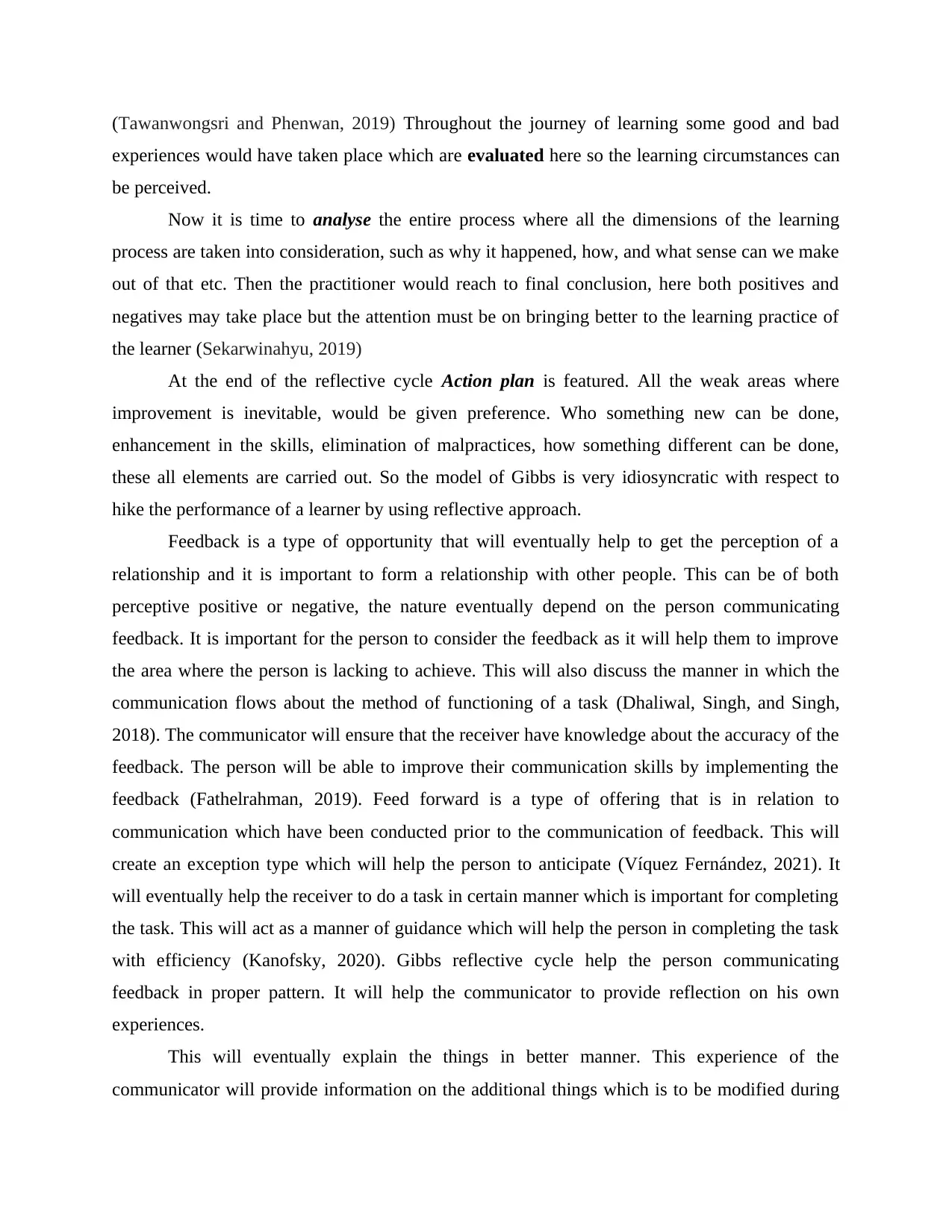
(Tawanwongsri and Phenwan, 2019) Throughout the journey of learning some good and bad
experiences would have taken place which are evaluated here so the learning circumstances can
be perceived.
Now it is time to analyse the entire process where all the dimensions of the learning
process are taken into consideration, such as why it happened, how, and what sense can we make
out of that etc. Then the practitioner would reach to final conclusion, here both positives and
negatives may take place but the attention must be on bringing better to the learning practice of
the learner (Sekarwinahyu, 2019)
At the end of the reflective cycle Action plan is featured. All the weak areas where
improvement is inevitable, would be given preference. Who something new can be done,
enhancement in the skills, elimination of malpractices, how something different can be done,
these all elements are carried out. So the model of Gibbs is very idiosyncratic with respect to
hike the performance of a learner by using reflective approach.
Feedback is a type of opportunity that will eventually help to get the perception of a
relationship and it is important to form a relationship with other people. This can be of both
perceptive positive or negative, the nature eventually depend on the person communicating
feedback. It is important for the person to consider the feedback as it will help them to improve
the area where the person is lacking to achieve. This will also discuss the manner in which the
communication flows about the method of functioning of a task (Dhaliwal, Singh, and Singh,
2018). The communicator will ensure that the receiver have knowledge about the accuracy of the
feedback. The person will be able to improve their communication skills by implementing the
feedback (Fathelrahman, 2019). Feed forward is a type of offering that is in relation to
communication which have been conducted prior to the communication of feedback. This will
create an exception type which will help the person to anticipate (Víquez Fernández, 2021). It
will eventually help the receiver to do a task in certain manner which is important for completing
the task. This will act as a manner of guidance which will help the person in completing the task
with efficiency (Kanofsky, 2020). Gibbs reflective cycle help the person communicating
feedback in proper pattern. It will help the communicator to provide reflection on his own
experiences.
This will eventually explain the things in better manner. This experience of the
communicator will provide information on the additional things which is to be modified during
experiences would have taken place which are evaluated here so the learning circumstances can
be perceived.
Now it is time to analyse the entire process where all the dimensions of the learning
process are taken into consideration, such as why it happened, how, and what sense can we make
out of that etc. Then the practitioner would reach to final conclusion, here both positives and
negatives may take place but the attention must be on bringing better to the learning practice of
the learner (Sekarwinahyu, 2019)
At the end of the reflective cycle Action plan is featured. All the weak areas where
improvement is inevitable, would be given preference. Who something new can be done,
enhancement in the skills, elimination of malpractices, how something different can be done,
these all elements are carried out. So the model of Gibbs is very idiosyncratic with respect to
hike the performance of a learner by using reflective approach.
Feedback is a type of opportunity that will eventually help to get the perception of a
relationship and it is important to form a relationship with other people. This can be of both
perceptive positive or negative, the nature eventually depend on the person communicating
feedback. It is important for the person to consider the feedback as it will help them to improve
the area where the person is lacking to achieve. This will also discuss the manner in which the
communication flows about the method of functioning of a task (Dhaliwal, Singh, and Singh,
2018). The communicator will ensure that the receiver have knowledge about the accuracy of the
feedback. The person will be able to improve their communication skills by implementing the
feedback (Fathelrahman, 2019). Feed forward is a type of offering that is in relation to
communication which have been conducted prior to the communication of feedback. This will
create an exception type which will help the person to anticipate (Víquez Fernández, 2021). It
will eventually help the receiver to do a task in certain manner which is important for completing
the task. This will act as a manner of guidance which will help the person in completing the task
with efficiency (Kanofsky, 2020). Gibbs reflective cycle help the person communicating
feedback in proper pattern. It will help the communicator to provide reflection on his own
experiences.
This will eventually explain the things in better manner. This experience of the
communicator will provide information on the additional things which is to be modified during
Paraphrase This Document
Need a fresh take? Get an instant paraphrase of this document with our AI Paraphraser
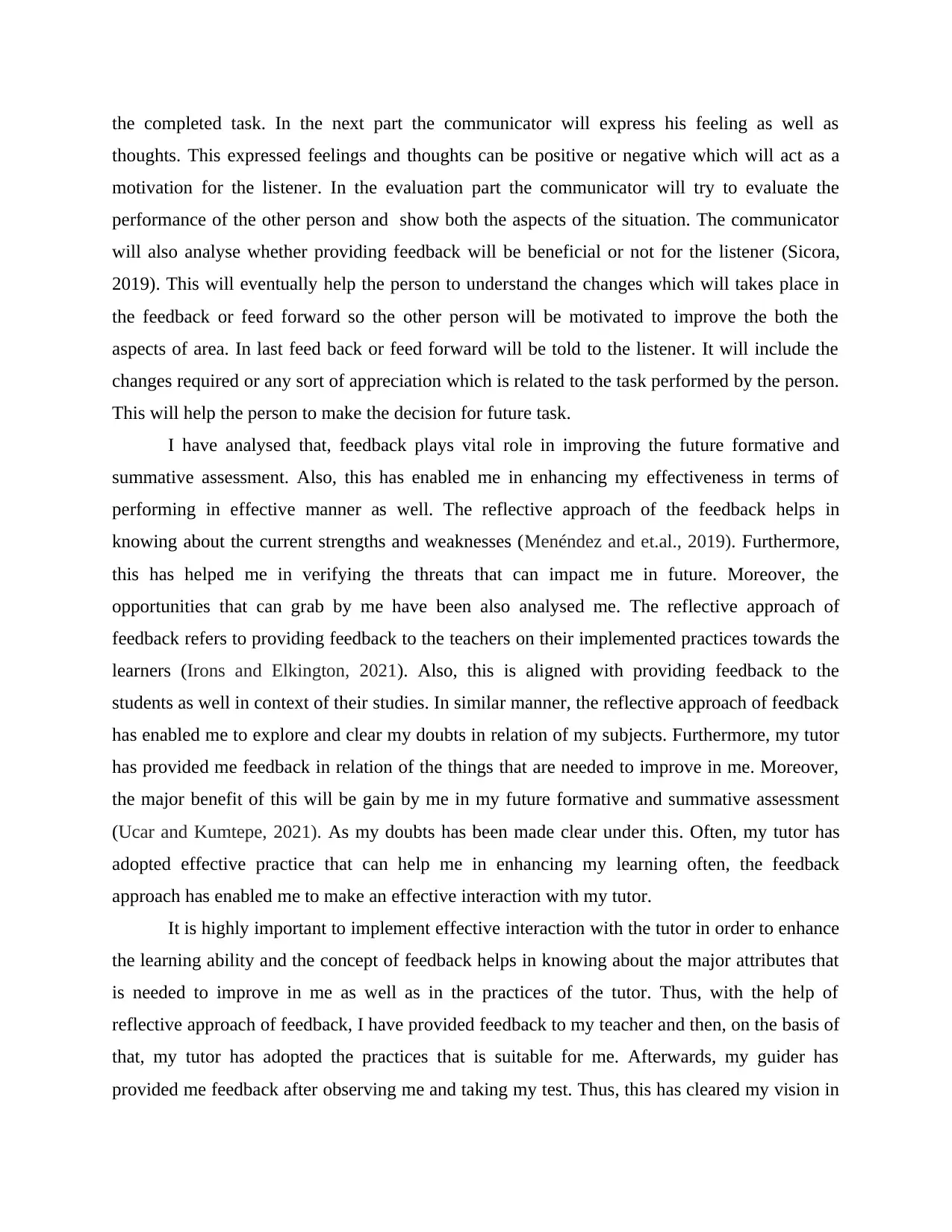
the completed task. In the next part the communicator will express his feeling as well as
thoughts. This expressed feelings and thoughts can be positive or negative which will act as a
motivation for the listener. In the evaluation part the communicator will try to evaluate the
performance of the other person and show both the aspects of the situation. The communicator
will also analyse whether providing feedback will be beneficial or not for the listener (Sicora,
2019). This will eventually help the person to understand the changes which will takes place in
the feedback or feed forward so the other person will be motivated to improve the both the
aspects of area. In last feed back or feed forward will be told to the listener. It will include the
changes required or any sort of appreciation which is related to the task performed by the person.
This will help the person to make the decision for future task.
I have analysed that, feedback plays vital role in improving the future formative and
summative assessment. Also, this has enabled me in enhancing my effectiveness in terms of
performing in effective manner as well. The reflective approach of the feedback helps in
knowing about the current strengths and weaknesses (Menéndez and et.al., 2019). Furthermore,
this has helped me in verifying the threats that can impact me in future. Moreover, the
opportunities that can grab by me have been also analysed me. The reflective approach of
feedback refers to providing feedback to the teachers on their implemented practices towards the
learners (Irons and Elkington, 2021). Also, this is aligned with providing feedback to the
students as well in context of their studies. In similar manner, the reflective approach of feedback
has enabled me to explore and clear my doubts in relation of my subjects. Furthermore, my tutor
has provided me feedback in relation of the things that are needed to improve in me. Moreover,
the major benefit of this will be gain by me in my future formative and summative assessment
(Ucar and Kumtepe, 2021). As my doubts has been made clear under this. Often, my tutor has
adopted effective practice that can help me in enhancing my learning often, the feedback
approach has enabled me to make an effective interaction with my tutor.
It is highly important to implement effective interaction with the tutor in order to enhance
the learning ability and the concept of feedback helps in knowing about the major attributes that
is needed to improve in me as well as in the practices of the tutor. Thus, with the help of
reflective approach of feedback, I have provided feedback to my teacher and then, on the basis of
that, my tutor has adopted the practices that is suitable for me. Afterwards, my guider has
provided me feedback after observing me and taking my test. Thus, this has cleared my vision in
thoughts. This expressed feelings and thoughts can be positive or negative which will act as a
motivation for the listener. In the evaluation part the communicator will try to evaluate the
performance of the other person and show both the aspects of the situation. The communicator
will also analyse whether providing feedback will be beneficial or not for the listener (Sicora,
2019). This will eventually help the person to understand the changes which will takes place in
the feedback or feed forward so the other person will be motivated to improve the both the
aspects of area. In last feed back or feed forward will be told to the listener. It will include the
changes required or any sort of appreciation which is related to the task performed by the person.
This will help the person to make the decision for future task.
I have analysed that, feedback plays vital role in improving the future formative and
summative assessment. Also, this has enabled me in enhancing my effectiveness in terms of
performing in effective manner as well. The reflective approach of the feedback helps in
knowing about the current strengths and weaknesses (Menéndez and et.al., 2019). Furthermore,
this has helped me in verifying the threats that can impact me in future. Moreover, the
opportunities that can grab by me have been also analysed me. The reflective approach of
feedback refers to providing feedback to the teachers on their implemented practices towards the
learners (Irons and Elkington, 2021). Also, this is aligned with providing feedback to the
students as well in context of their studies. In similar manner, the reflective approach of feedback
has enabled me to explore and clear my doubts in relation of my subjects. Furthermore, my tutor
has provided me feedback in relation of the things that are needed to improve in me. Moreover,
the major benefit of this will be gain by me in my future formative and summative assessment
(Ucar and Kumtepe, 2021). As my doubts has been made clear under this. Often, my tutor has
adopted effective practice that can help me in enhancing my learning often, the feedback
approach has enabled me to make an effective interaction with my tutor.
It is highly important to implement effective interaction with the tutor in order to enhance
the learning ability and the concept of feedback helps in knowing about the major attributes that
is needed to improve in me as well as in the practices of the tutor. Thus, with the help of
reflective approach of feedback, I have provided feedback to my teacher and then, on the basis of
that, my tutor has adopted the practices that is suitable for me. Afterwards, my guider has
provided me feedback after observing me and taking my test. Thus, this has cleared my vision in
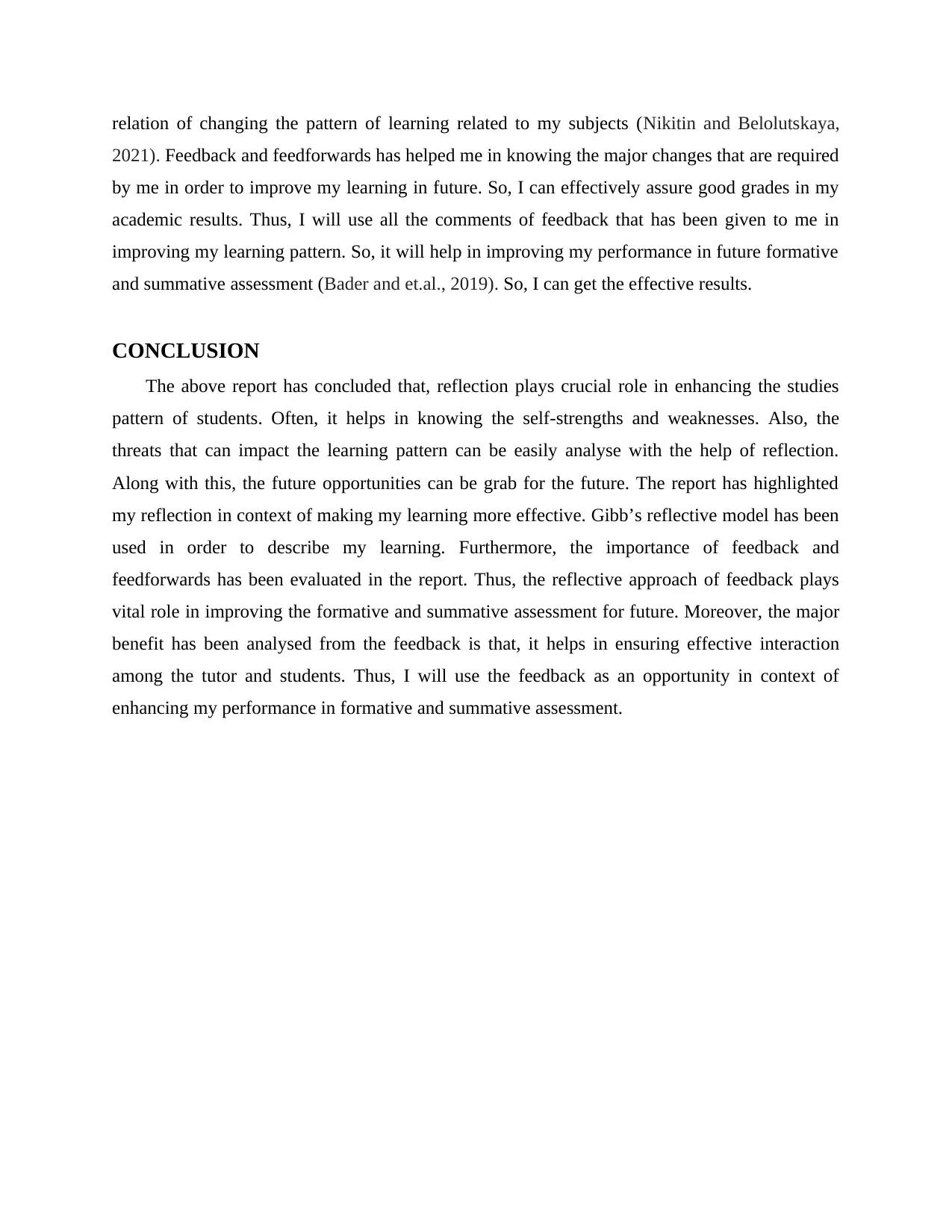
relation of changing the pattern of learning related to my subjects (Nikitin and Belolutskaya,
2021). Feedback and feedforwards has helped me in knowing the major changes that are required
by me in order to improve my learning in future. So, I can effectively assure good grades in my
academic results. Thus, I will use all the comments of feedback that has been given to me in
improving my learning pattern. So, it will help in improving my performance in future formative
and summative assessment (Bader and et.al., 2019). So, I can get the effective results.
CONCLUSION
The above report has concluded that, reflection plays crucial role in enhancing the studies
pattern of students. Often, it helps in knowing the self-strengths and weaknesses. Also, the
threats that can impact the learning pattern can be easily analyse with the help of reflection.
Along with this, the future opportunities can be grab for the future. The report has highlighted
my reflection in context of making my learning more effective. Gibb’s reflective model has been
used in order to describe my learning. Furthermore, the importance of feedback and
feedforwards has been evaluated in the report. Thus, the reflective approach of feedback plays
vital role in improving the formative and summative assessment for future. Moreover, the major
benefit has been analysed from the feedback is that, it helps in ensuring effective interaction
among the tutor and students. Thus, I will use the feedback as an opportunity in context of
enhancing my performance in formative and summative assessment.
2021). Feedback and feedforwards has helped me in knowing the major changes that are required
by me in order to improve my learning in future. So, I can effectively assure good grades in my
academic results. Thus, I will use all the comments of feedback that has been given to me in
improving my learning pattern. So, it will help in improving my performance in future formative
and summative assessment (Bader and et.al., 2019). So, I can get the effective results.
CONCLUSION
The above report has concluded that, reflection plays crucial role in enhancing the studies
pattern of students. Often, it helps in knowing the self-strengths and weaknesses. Also, the
threats that can impact the learning pattern can be easily analyse with the help of reflection.
Along with this, the future opportunities can be grab for the future. The report has highlighted
my reflection in context of making my learning more effective. Gibb’s reflective model has been
used in order to describe my learning. Furthermore, the importance of feedback and
feedforwards has been evaluated in the report. Thus, the reflective approach of feedback plays
vital role in improving the formative and summative assessment for future. Moreover, the major
benefit has been analysed from the feedback is that, it helps in ensuring effective interaction
among the tutor and students. Thus, I will use the feedback as an opportunity in context of
enhancing my performance in formative and summative assessment.
⊘ This is a preview!⊘
Do you want full access?
Subscribe today to unlock all pages.

Trusted by 1+ million students worldwide
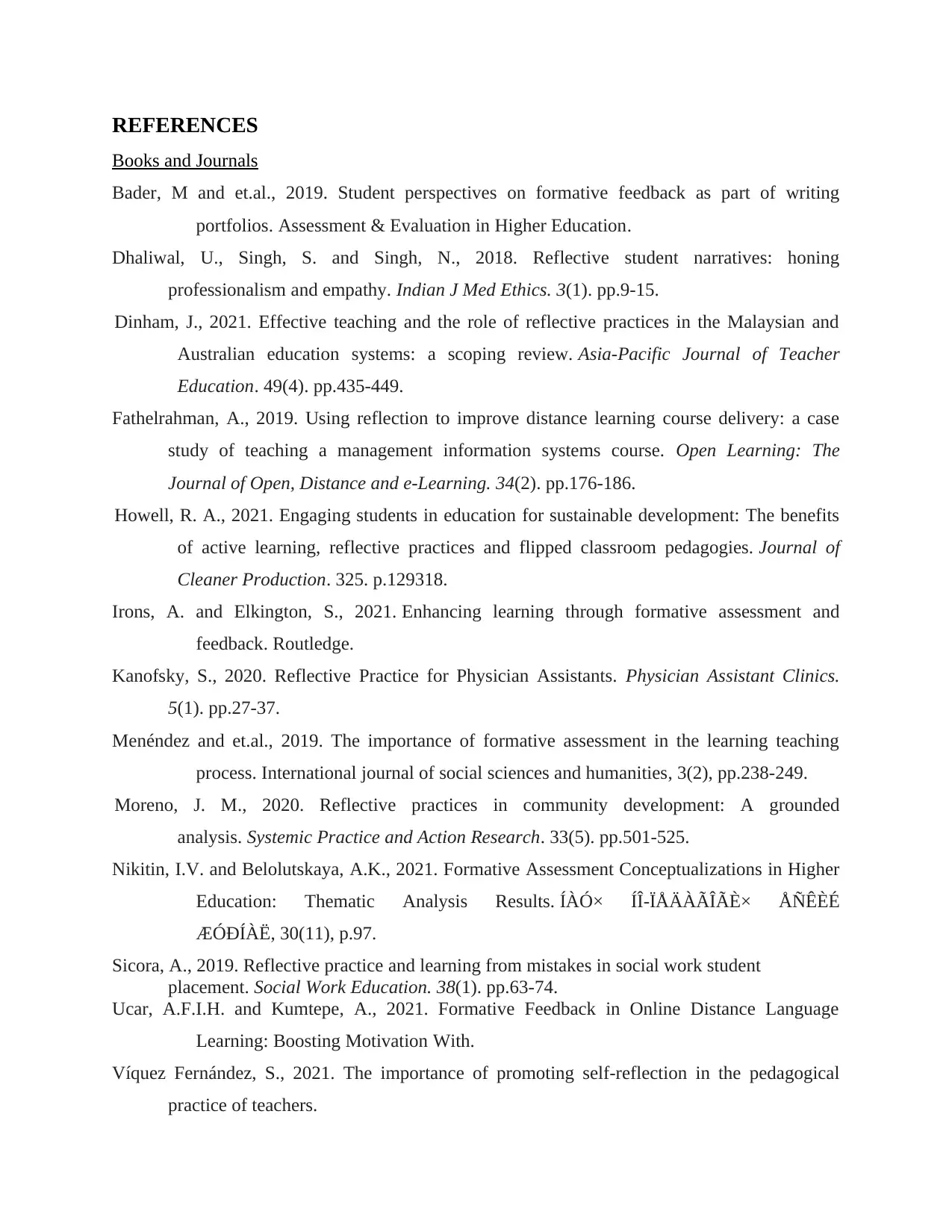
REFERENCES
Books and Journals
Bader, M and et.al., 2019. Student perspectives on formative feedback as part of writing
portfolios. Assessment & Evaluation in Higher Education.
Dhaliwal, U., Singh, S. and Singh, N., 2018. Reflective student narratives: honing
professionalism and empathy. Indian J Med Ethics. 3(1). pp.9-15.
Dinham, J., 2021. Effective teaching and the role of reflective practices in the Malaysian and
Australian education systems: a scoping review. Asia-Pacific Journal of Teacher
Education. 49(4). pp.435-449.
Fathelrahman, A., 2019. Using reflection to improve distance learning course delivery: a case
study of teaching a management information systems course. Open Learning: The
Journal of Open, Distance and e-Learning. 34(2). pp.176-186.
Howell, R. A., 2021. Engaging students in education for sustainable development: The benefits
of active learning, reflective practices and flipped classroom pedagogies. Journal of
Cleaner Production. 325. p.129318.
Irons, A. and Elkington, S., 2021. Enhancing learning through formative assessment and
feedback. Routledge.
Kanofsky, S., 2020. Reflective Practice for Physician Assistants. Physician Assistant Clinics.
5(1). pp.27-37.
Menéndez and et.al., 2019. The importance of formative assessment in the learning teaching
process. International journal of social sciences and humanities, 3(2), pp.238-249.
Moreno, J. M., 2020. Reflective practices in community development: A grounded
analysis. Systemic Practice and Action Research. 33(5). pp.501-525.
Nikitin, I.V. and Belolutskaya, A.K., 2021. Formative Assessment Conceptualizations in Higher
Education: Thematic Analysis Results. ÍÀÓ× ÍÎ-ÏÅÄÀÃÎÃÈ× ÅÑÊÈÉ
ÆÓÐÍÀË, 30(11), p.97.
Sicora, A., 2019. Reflective practice and learning from mistakes in social work student
placement. Social Work Education. 38(1). pp.63-74.
Ucar, A.F.I.H. and Kumtepe, A., 2021. Formative Feedback in Online Distance Language
Learning: Boosting Motivation With.
Víquez Fernández, S., 2021. The importance of promoting self-reflection in the pedagogical
practice of teachers.
Books and Journals
Bader, M and et.al., 2019. Student perspectives on formative feedback as part of writing
portfolios. Assessment & Evaluation in Higher Education.
Dhaliwal, U., Singh, S. and Singh, N., 2018. Reflective student narratives: honing
professionalism and empathy. Indian J Med Ethics. 3(1). pp.9-15.
Dinham, J., 2021. Effective teaching and the role of reflective practices in the Malaysian and
Australian education systems: a scoping review. Asia-Pacific Journal of Teacher
Education. 49(4). pp.435-449.
Fathelrahman, A., 2019. Using reflection to improve distance learning course delivery: a case
study of teaching a management information systems course. Open Learning: The
Journal of Open, Distance and e-Learning. 34(2). pp.176-186.
Howell, R. A., 2021. Engaging students in education for sustainable development: The benefits
of active learning, reflective practices and flipped classroom pedagogies. Journal of
Cleaner Production. 325. p.129318.
Irons, A. and Elkington, S., 2021. Enhancing learning through formative assessment and
feedback. Routledge.
Kanofsky, S., 2020. Reflective Practice for Physician Assistants. Physician Assistant Clinics.
5(1). pp.27-37.
Menéndez and et.al., 2019. The importance of formative assessment in the learning teaching
process. International journal of social sciences and humanities, 3(2), pp.238-249.
Moreno, J. M., 2020. Reflective practices in community development: A grounded
analysis. Systemic Practice and Action Research. 33(5). pp.501-525.
Nikitin, I.V. and Belolutskaya, A.K., 2021. Formative Assessment Conceptualizations in Higher
Education: Thematic Analysis Results. ÍÀÓ× ÍÎ-ÏÅÄÀÃÎÃÈ× ÅÑÊÈÉ
ÆÓÐÍÀË, 30(11), p.97.
Sicora, A., 2019. Reflective practice and learning from mistakes in social work student
placement. Social Work Education. 38(1). pp.63-74.
Ucar, A.F.I.H. and Kumtepe, A., 2021. Formative Feedback in Online Distance Language
Learning: Boosting Motivation With.
Víquez Fernández, S., 2021. The importance of promoting self-reflection in the pedagogical
practice of teachers.
Paraphrase This Document
Need a fresh take? Get an instant paraphrase of this document with our AI Paraphraser

1 out of 8
Related Documents
Your All-in-One AI-Powered Toolkit for Academic Success.
+13062052269
info@desklib.com
Available 24*7 on WhatsApp / Email
![[object Object]](/_next/static/media/star-bottom.7253800d.svg)
Unlock your academic potential
Copyright © 2020–2026 A2Z Services. All Rights Reserved. Developed and managed by ZUCOL.




